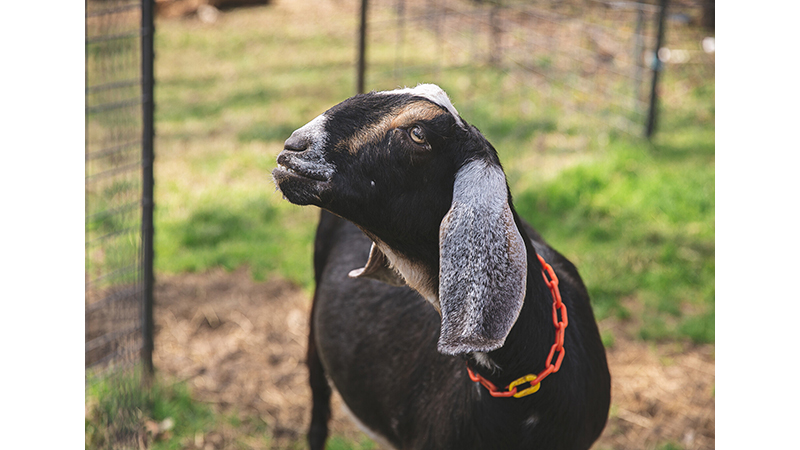Dairy goats gain popularity with small farmers, 4-Hers
Published 11:00 am Sunday, June 13, 2021

- Dairy goats have become more popular among 4-H livestock program members, people who participate in various other showmanship contests and people who want goat milk products. (Photo by MSU Extension Service/Michaela Parker) Alt-text: A black goat with an orange chain collar.
|
Getting your Trinity Audio player ready...
|
By Susan Collins-Smith
MSU Extension Service
RAYMOND, Miss. — Dairy goats make up a niche market of the Mississippi livestock industry, but their popularity is growing across the state.
“That’s been the case in the whole Southeastern United States,” said Rocky Lemus, an MSU Extension Service forage specialist and Mississippi Agricultural and Forestry Experiment Station scientist who also raises dairy goats. “We’ve seen an almost 25% increase in dairy goats across our region in the last 10 years.”
Interest has grown among 4-H livestock program members, people who participate in various other showmanship contests and people who want goat milk products. Lemus said producers account for most goat ownership in Mississippi, helping to meet the demand from inside and outside the state.
Scott Jenkins of Sturgis is one of those producers. He raises Nubian goats, a breed favored for its milk quality. High fat content results in more flavorful cheese, milk and ice cream from these goats. Top milking breeds include Alpine, LaMancha, Nubian, Saanen and Toggenburg. Each breed has its own aesthetic, personality and milk-production characteristics.
Jenkins has been raising goats for 20 years, first as a herd manager for a North Carolina goat dairy for about 10 years and then with his own small herd for the past 10 years.
“I enjoy showing our goats and am a member of several state and national associations,” said Jenkins, whose full-time job is teaching high school history. “I have several customers who are 4-H’ers who want a project goat to raise and show. But about 70% of my customers are individuals or small producers who want to make goat milk products.”
Although people often make and sell nonedible items, such as soap and lotion, Mississippi regulations require goat dairies to be certified Grade A. That certification is very difficult to accomplish for small farms with small herds because of the financial investment. However, in other states, selling edible products is a growing business, Jenkins said.
“Artisan cheeses are becoming a big thing,” he said. “There are a lot of people all over the country who are getting into that. I’ve been making ice cream and cheese for a while. I think if the Legislature makes some changes, we will see several goat dairies open in Mississippi.”
Many young 4-H’ers choose goats because they are easier to handle and require less space to raise than larger animals. Goats also have endearing personalities and can form a bond with their owners, much like dogs. These same traits make goats desirable to those who raise them for their milk or to diversify their farm businesses.
Lemus said different breeds are suitable for different purposes. Although any breed of goat can be raised for meat, certain breeds are better for milking. For people who want goats for brush control, Boer, Spanish and Kiko breeds are most suitable.
Goats are sometimes perceived as challenging to raise, primarily because of their susceptibility to parasites. But with a good operating plan, rotational grazing management practices, parasite control measures and proper health care, goats will thrive, Lemus said.
Producers gained additional expertise in this area with the hire of Leyla Rios in December 2020. She serves as Extension small ruminant specialist and conducts research as an Experiment Station scientist.
Rios said she is eager to build relationships with sheep and goat producers as she continues existing programs and establishes new ones.
“I want to get to know our producers across the state and learn what their needs are related to the management of their animals,” she said.
Rios will conduct two research projects in 2021 and 2022. In one, she and a group of MSU Extension specialists will use an online survey to understand goat and sheep producers’ current management practices to help them improve their operations. In the other, she will do hands-on research to help producers make the best decision about when to deworm their animals, which will help combat the growing worldwide issue of parasite resistance.
A native of Venezuela, Rios comes to MSU from Universidad Central de Venezuela, where she was an associate professor. She also was an associate researcher at the Colombian Agricultural Research Corporation.
She earned a master’s degree in animal nutrition and a doctorate in parasitology from Edinburgh University and Moredun Research Institute in Scotland. Recently, she was included as an affiliate member of the American Consortium for Small Ruminant Parasite Control.





